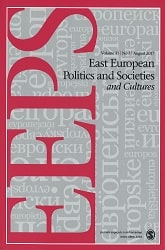Introduction: Conceptualizations of the Holocaust in Germany, Poland, Lithuania, Belarus, and Ukraine: Historical Research, Public Debates, and Methodological Disputes
Introduction: Conceptualizations of the Holocaust in Germany, Poland, Lithuania, Belarus, and Ukraine: Historical Research, Public Debates, and Methodological Disputes
Author(s): Grzegorz Rossolinski-LiebeSubject(s): Methodology and research technology, Studies in violence and power, Victimology, Fascism, Nazism and WW II, History of the Holocaust, History of Antisemitism, Philosophy of History
Published by: SAGE Publications Ltd
Keywords: Holocaust; Poland; Belarus; Historiography; Lithuania;
Summary/Abstract: The Shoah belongs to one of the most thoroughly investigated aspects of modern European history. Scholars have used the Holocaust methodology to study other genocides, or forms of ethnic or political violence. Nevertheless, our understanding of the extermination of the European Jewry is limited, fragmented, and changes constantly due to new investigation methods, research interests, and public debates. The first studies on the Holocaust were conducted already during the Shoah but because of different reasons historians in some countries such as Germany and Ukraine did not pay much attention to them and concentrated rather on the documents left by the perpetrators and their fate during the war. While in Poland the research on the Holocaust never stopped, even if it was subjected to various political and ideological limitations, and the Shoah has been publicly debated since the middle of the 1980s, this was not the case in Lithuania, Belarus, and Ukraine. Nevertheless, in the last two decades, the importance of the Holocaust was discovered in these countries as well and it is currently conceptualized in the framework of regional, national, and European history.
Journal: East European Politics and Societies
- Issue Year: 34/2020
- Issue No: 01
- Page Range: 129-142
- Page Count: 14
- Language: English
- Content File-PDF

